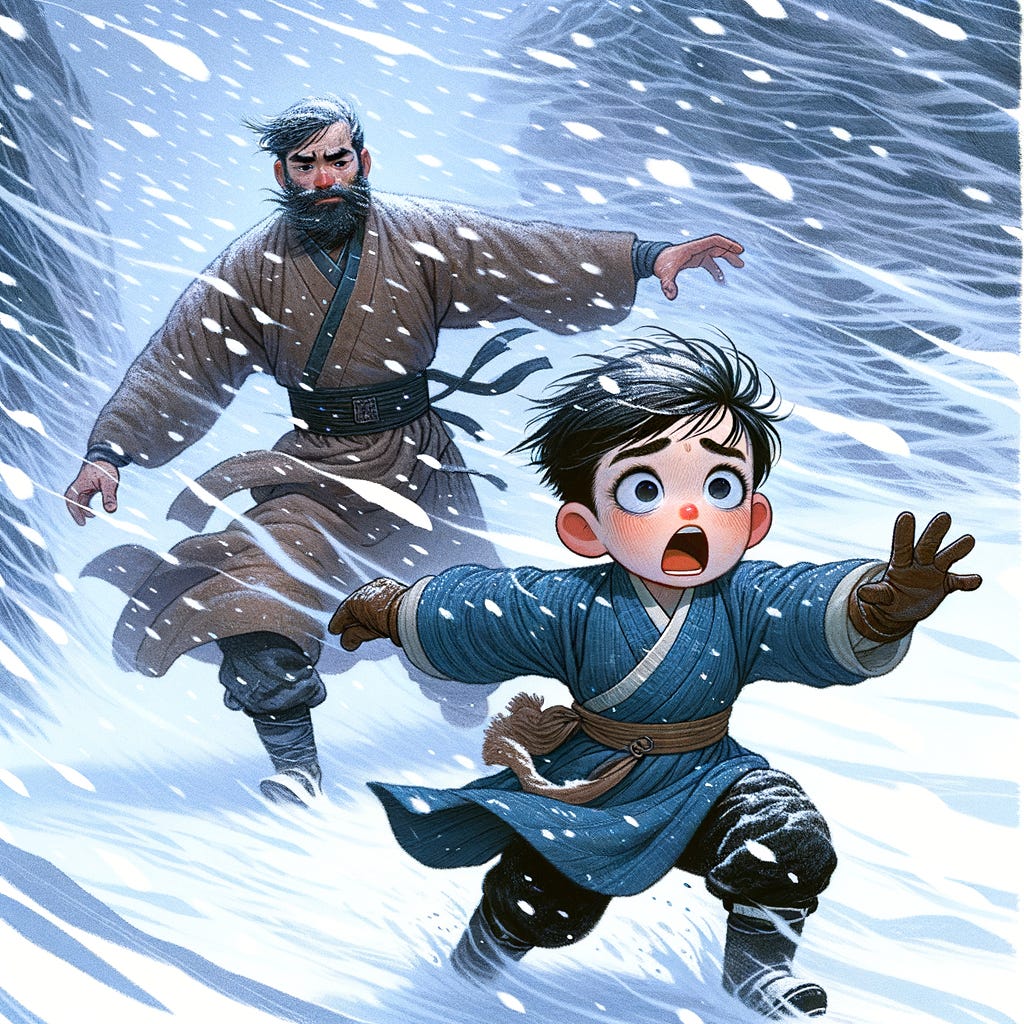Let the story begin…
영호는 아버지와 함께 추운 겨울 산길을 걸어 내려오고 있었어요.
영호는 (Yeong-ho): "영호" is a person's name, "는" is a topic marker.
아버지와 함께 (with father): "아버지" means father, "와 함께" means together with.
추운 겨울 (cold winter): "추운" means cold, "겨울" means winter.
산길을 (mountain path): "산길" means mountain path, "을" is an object marker.
걸어 (walking): "걷다" means to walk, "어" is a connective ending.
내려오고 있었어요 (was coming down): "내려오다" means to come down, "고 있었어요" is a past progressive tense ending.
✍️ "Yeong-ho was walking down the cold winter mountain path with his father."
아들아, 날이 어두워지고 있구나. 어서 걸음을 재촉하자
아들아 (son): "아들" means son, "아" is a vocative particle used to address someone.
날이 (the day): "날" means day, "이" is a subject marker.
어두워지고 있구나 (is getting dark): "어둡다" means dark, "어" is dropped and "워지다" is added to mean "getting dark", "고 있다" indicates the progressive tense, "구나" is a sentence ending that expresses a realization.
어서 (quickly): an adverb meaning quickly.
걸음을 (walking): "걸음" means a step or walking, "을" is an object marker.
재촉하자 (let's hurry): "재촉하다" means to urge or hurry, "자" is a propositive ending used to make a suggestion.
✍️ "Son, the day is getting dark. Let's quickly hurry our steps."
그때 갑자기 눈보라가 몰아쳤어요.
그때 (at that time): "그" is a demonstrative referring to something previously mentioned, "때" means time.
갑자기 (suddenly): an adverb meaning suddenly or abruptly.
눈보라가 (a snowstorm): "눈보라" means snowstorm, "가" is a subject marker.
몰아쳤어요 (hit/struck): "몰아치다" means to hit or strike with force, "었어요" is a past tense ending.
✍️ "At that time, a snowstorm suddenly struck."
아버지! 앞이 안 보여요!
아버지! (Father!): A noun used to address one's father, followed by an exclamation mark for emphasis.
앞이 (the front): "앞" means front, and "이" is a subject marker.
안 (not): A negative adverb meaning "not".
보여요 (is visible): "보이다" means to be visible, and "여요" is a present tense polite ending.
✍️ "Father! I can't see what's in front of me!"
영호는 눈보라에 휩쓸려 아버지의 손을 놓쳐버렸어요.
영호는 (Yeong-ho): "영호" is a person's name, "는" is a subject marking particle
눈보라에 (in the snowstorm): "눈보라" means snowstorm, "에" is a location particle.
휩쓸려 (swept away): "휩쓸리다" means to be swept away, "려" is a passive verb ending.
아버지의 손을 (father's hand): "아버지" means father, "의" is a possessive particle, "손" means hand, "을" is a object marker.
놓쳐버렸어요 (let go of): "놓치다" means to let go of, "버리다" is an auxiliary verb indicating completion, "었어요" is a past tense ending.
✍️ "Yeong-ho was swept away in the snowstorm and let go of father’s hand"
아버지! 어디 계세요? 아버지!
아버지 (father): A noun meaning father.
어디 (where): A question word asking about location.
계세요 (are you): "계시다" is an honorific form of "있다" which means "to be/exist," and "에요" is a polite sentence ending. Together, "계세요" means "are you" in a respectful way.
✍️ "Father! Where are you? Father!"
Keep reading with a 7-day free trial
Subscribe to Hugo's Study Room to keep reading this post and get 7 days of free access to the full post archives.











